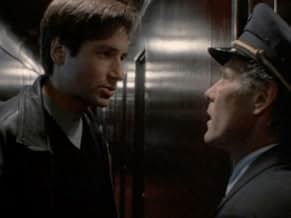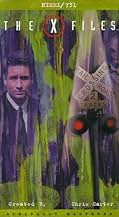731
- Episode aired Dec 1, 1995
- TV-14
- 45m
Mulder becomes trapped aboard a train rigged with an explosive device. Scully searches for the truth behind the government's secret experiments.Mulder becomes trapped aboard a train rigged with an explosive device. Scully searches for the truth behind the government's secret experiments.Mulder becomes trapped aboard a train rigged with an explosive device. Scully searches for the truth behind the government's secret experiments.
- The Soldier
- (uncredited)
- Mother
- (uncredited)
Featured reviews
A cinematic follow-up
The previous episode, Nisei, ended with a high amount of promise, which 731 delivers with aplomb, along with a further twist in the ongoing conspiracy narrative.
I think the separate plots of Mulder and Scully complement each other and link together perfectly. Scully's scenes are especially hard-hitting, alluding to atrocities committed in WWII, which links well to the associated deals between the US government and certain war criminals.
Mulder has a good quota of action and suspense, which is very well done by the filmmakers. It feels like a Hitchcock tribute in some moments, plus David Duchovny is like a small-screen version of Tom Cruise in his stunt work.
At this point in the series run, the writers have placed a fresh new perspective on previously depicted events. During my original watch back in the 90s, I didn't go much further than season four, so it will be interesting to see if this mythology arc can continue to develop as it has so far.
Apology is Policy.
Fast paced and energetic, this is blessed with a cracking script, and places both investigators in trouble, there are multiple nail biting moments.
It's one of those episodes that's well worth watching a second time, there is so much happening, it's almost easy to miss a few bits.
Not a huge amount of answers given to Mulder or Scully, they are teased, and tempted with snippets, but plenty to rev the duo up for future cases.
Interesting to see the tag line altered for this one.
I loved it, I thought this was really impressive, 9/10.
A continuation of the series' intricate mythology, delving into themes of government conspiracy, human experimentation, and the ethical implications of scientific advancement
The narrative begins with Mulder's desperate attempt to board the moving train, which is laden with secrets and danger. The pacing is expertly crafted, maintaining a sense of urgency as Mulder navigates through tense encounters and confrontations. The episode effectively intertwines action with exposition, revealing critical information about Operation Paperclip and its dark legacy involving human experimentation. This historical context adds depth to the narrative, linking Mulder's personal quest for truth with broader societal issues regarding accountability and ethics in science.
Visually, "731" employs a dark and claustrophobic aesthetic that enhances its themes of fear and paranoia. Nutter's direction captures the oppressive atmosphere of both the train and the military facilities associated with the experiments. The cinematography effectively contrasts light and shadow, symbolizing the duality of truth and deception that permeates the episode. Critics have praised this visual storytelling for its ability to immerse viewers in the unsettling world of conspiracy and cover-up.
The performances in this episode are particularly strong, especially from Duchovny as he portrays Mulder's determination and desperation in his quest for answers. His emotional depth is evident as he confronts both external threats and his own fears regarding the implications of his discoveries. Anderson's Scully provides a rational counterbalance; her skepticism grounds Mulder's theories while emphasizing her commitment to uncovering the truth behind her own experiences. The supporting cast also delivers notable performances, particularly in their interactions with Mulder and Scully, which reveal both complicity and fear among those involved in the conspiracy.
Thematically, "731" raises important questions about morality, accountability, and the consequences of scientific experimentation. The episode examines how individuals can become complicit in atrocities when driven by ambition or fear; it explores how government entities manipulate knowledge for their own gain while disregarding ethical considerations. Additionally, it highlights societal attitudes toward past injustices; characters like Kazuo Sakurai (played by Michael Shamus Wiles) represent the complexities of loyalty and betrayal within a system fraught with corruption. This exploration invites viewers to reflect on their beliefs regarding justice, accountability, and the moral implications of historical actions.
In conclusion, "731" stands out as a significant entry in "The X-Files," successfully blending elements of psychological drama with historical commentary while advancing key plotlines that resonate throughout future episodes. While it may leave some questions unanswered, it effectively maintains tension and intrigue throughout its runtime. The exploration of these themes within a modern context invites viewers to consider their perceptions of truth and morality in society, solidifying "The X-Files" as a thought-provoking examination of human experience amidst extraordinary phenomena. As it reflects broader societal concerns regarding historical injustices and governmental secrecy, this episode leaves audiences pondering their own relationships with accountability and ethical responsibility.
Did you know
- TriviaThe tagline changes from "The truth is out there" to "Apology is policy".
- GoofsThe journals in Dr. Zama's possession, handwritten all in Japanese, are seen a couple of times during the episode. On two different occasions, as Mulder flips through their pages, we can see that all of the pages are exact duplicates of each other: four identical pages in the original journal, and two identical pages in the "rewritten" journal seen towards the end of the episode.
- Quotes
Scully: Don't you see Mulder, you're doing their work for them. You're chasing aliens that aren't there, helping them to create the story that covers the shameful truth. And what they can't cover they apologize for. Apology has become policy.
Mulder: Maybe. Maybe you're right, Scully. But I don't need an apology for the lies. I don't care about the fictions they create to cover their crimes. I want them held accountable for what did happen. I want them to apologize for the truth.
- Crazy creditsThe tagline reads "Apology is Policy."
- ConnectionsFeatured in El comisario: Secreto a voces (2005)
Details
- Release date
- Country of origin
- Official sites
- Language
- Filming locations
- Production companies
- See more company credits at IMDbPro
























